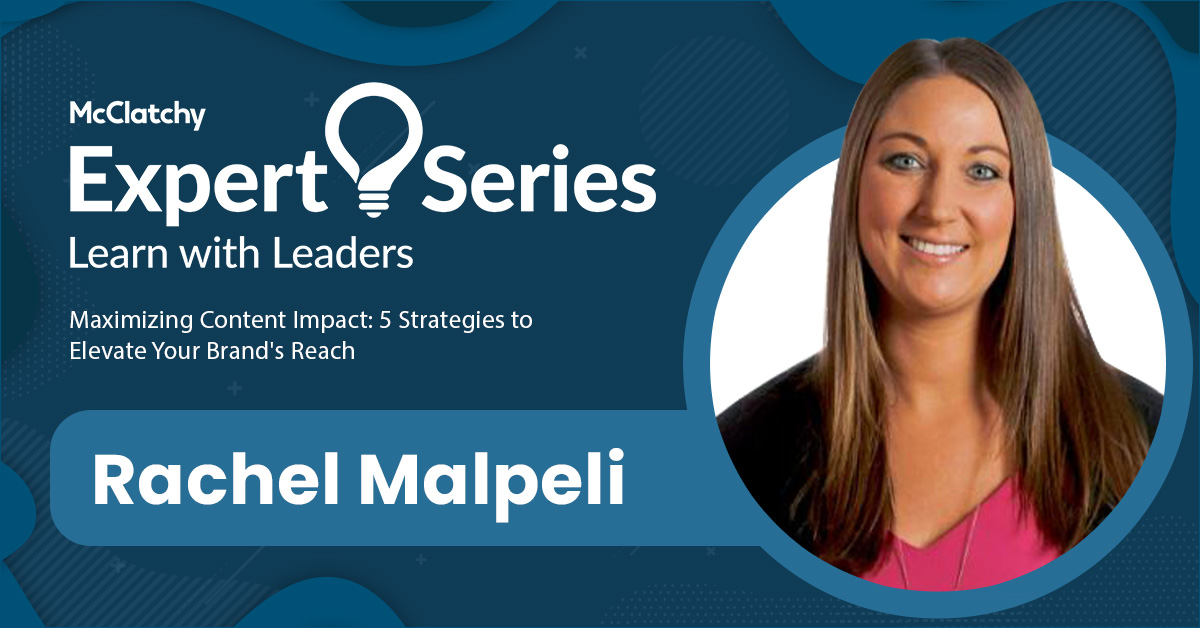McClatchy has been hosting an ongoing series, highlighting the many experts we have at our company.
This time, we will be sitting down with Expert Leader Ryan Crum, who leads a team of Client Success Strategists for McClatchy. He will be leading us through the intricacies of the consumer purchase journey, where marketing prowess takes center stage. Equipped with real-world examples and scenarios, this conversation will empower you to connect with consumers at every stage.
Let’s get started!
Discussing the Consumer Journey with Ryan Crum
Stephanie: Can you briefly overview the consumer journey and its key stages?
Ryan: The traditional funnel simplifies the customer journey, but it's more complex in reality. In today's digital landscape, you must consider how customers interact at different stages and tailor your marketing accordingly. For example, search engine marketing is conversion-driven, but its effectiveness depends on the context. This includes ad copy, website experience, and digital presence.
For example, a new company running a search campaign may have users click ads in the awareness stage as they are still researching companies and options. It's not solely about conversions. It's about aligning with the customer's journey. The approach should be tailoring your messaging to different funnel stages in your marketing campaign and website.
Whether it's a generic message for awareness or specific content for interest, align your creative with the consumer's mindset. Connect the dots by guiding them to the right website section. Creativity can influence what message will resonate with the customer in what funnel phase.
Stephanie: Absolutely. With the fragmented consumer journey, businesses compete for attention across channels. How crucial is a multi-channel marketing campaign with interconnected channels?
Ryan: It's vital. Businesses constantly feed leads to the top, nurturing them through various touchpoints. Don't focus solely on conversions. Nurture awareness to maintain a healthy funnel. Balance is critical. Concentrating on one stage can lead to missed opportunities.
Stephanie: Given the diverse consumer journey, could you describe the stages customers go through in the funnel?
Ryan: Typically, it moves from awareness to interest, then purchase, conversion, and advocacy. However, customers may enter or exit the funnel at any stage. Recognize the value of each stage, avoid fixation on a single aspect, and ensure a continuous flow of leads for sustained business success.
Stephanie: How does content marketing impact post-purchase?
Ryan: There's value in post-sale content marketing. Look at large businesses with huge budgets like Nike and McDonald's. Even though they are well-known, they continue running brand awareness ads because they understand the potential for conversions. People should observe what Fortune 500 companies do. Keep in mind that the funnel isn't just vertical. Customers move horizontally through it, and there's value in considering various stages, as you never know what will drive that purchase decision.
Stephanie: It's not just about focusing on conversions but providing quality consumer experiences across channels.
Ryan: Absolutely. Clients' websites are not discussed and analyzed enough in 2024. It's your lifeblood. You must set the stage on your site to cater to customers at any stage in the funnel. Do you have a place for people in the interest stage? The awareness stage? While landing pages have value, they are primarily conversion-driven and speak to something other than the other funnel stages. Being ready to engage customers regardless of where they are in the life cycle is essential. You need to prepare to retain business.
Stephanie: This aligns with changes in privacy and data collection. First-party data is crucial, and a website that meets customers where they are ensures you gather valuable data for business growth - is that what I hear correctly?
Ryan: Analyzing data with tools like Google Analytics is critical. Understanding how users interact with your site informs your marketing strategy. If customers spend time on a specific page, use that data to create targeted content and streamline their journey. This again leads back to having a wide variety of content and subject matter. You don't need to rely solely on third-party data or cookies when you have a wealth of first-party data at your fingertips.
Once you have data, making informed decisions becomes easier. This aligns with identifying goals, key performance indicators, and understanding your target audience. When someone reaches your site, you never know when or where they are in their purchase journey.

Stephanie: Is there a specific number of channels for a seamless experience, or does it depend on the target audience?
Ryan: There's no magic number. Understand your customer demographic and tailor your approach accordingly. Consider age groups, preferences, and behaviors. Recognize that it isn't what your first instinct tells you. For example, TikTok, often considered for younger audiences, also attracts older demographics. It's really about making informed decisions based on your unique audience.
Stephanie: So, understanding your audience is crucial. What about budget allocation across platforms with diverse goals?
Ryan: It's critical to take a holistic approach. Initially, leave all tactics and platforms on the table and set out a plan for reaching your audience. Consider your end goals – brand awareness, website traffic, or conversions – and allocate your budget accordingly. There's no one-size-fits-all solution. It depends on your specific objectives and the platforms that align with them.
When considering budget allocation, it is essential to work backward from your ultimate goal, such as acquiring leads. Start by determining the optimal cost per lead (CPL) and attracting sufficient people at different funnel stages. Avoid disproportionately focusing on one area and ensure every part of the funnel is within budget. Distribute the budget across various tactics, considering the importance of different touchpoints.
Now, when it comes to monitoring and optimization, vigilance is critical. Even with a perfect campaign, regular monitoring and adjustments are where good campaigns become great. Analyzing data, especially tracking user behavior on the website, helps make informed decisions. If a tactic isn't yielding the expected results, feel free to make adjustments and optimize the campaign continuously. This learning process should never end.
Stephanie: Can you share a real-life example of how you strategized with a business for consideration in all customer journey phases?
Ryan: One campaign we worked on was a real “a-ha” moment for me. The client we were working with was a new business in the home services/remodeling space. We witnessed their campaign generate quality traffic but failed to deliver solid prospects and leads - they wanted phone calls and wanted to book new appointments. The problem? They needed a more substantial web presence.
They needed a website and an online presence that met the customers where they were in the funnel – one that could drive education and awareness and inspire action. People need time, research, and touchpoints along the buyer's journey. The client was investing in SEM, and while the numbers looked promising, they were attracting interest and awareness rather than the intended consideration and decision stages. The missing pieces were glaring – no before-and-after photos, reviews, or Google My Business profile. It became apparent that their digital presence conveyed a lack of legitimacy.
It was a pivotal moment for us and the client as we guided them to reassess and rebuild, emphasizing the importance of a comprehensive strategy – a unified website, compelling tactics, and a customer-centric approach. It sheds light on how meeting clients at the right stage of their journey, providing essential information, and crafting a seamless experience are vital elements for success in consumer engagement.
Stephanie: Juggling all these aspects can be overwhelming for small and medium-sized businesses. What is different about partnering with McClatchy and their approach to developing a successful marketing plan to help businesses meet their objectives?
Ryan: McClatchy offers the advantage of experience. We've been through these processes and can provide guidance. Our team understands the power of data and can act quickly to make necessary changes. Working with us lets businesses focus on running their operations while we handle the marketing strategy. We bring a different perspective, leveraging our marketing expertise to guide companies toward the results they desire. We aim to be partners in our client's success, celebrating their victories and learning from challenges together.
We take pride in hearing success stories from clients, knowing our efforts contributed to their achievements. McClatchy's goal is to be an integral part of our client's marketing team, offering expertise and support to help them thrive in their respective industries.
Stephanie: It's not just about selling a campaign. It's about making businesses successful. Thank you for sharing these insights and experiences, Ryan. It's been a great conversation.
Ryan: It's my pleasure. I love discussing client engagement, the marketing funnel, and the consumer journey. If there's anything else you'd like to cover or if you have additional questions, feel free to ask.
We’re glad Ryan could join us to share his expertise on the consumer journey. Reach out to us today to learn more about how the experts at McClatchy can help your business.






